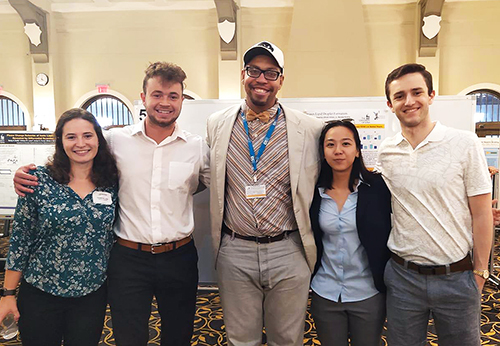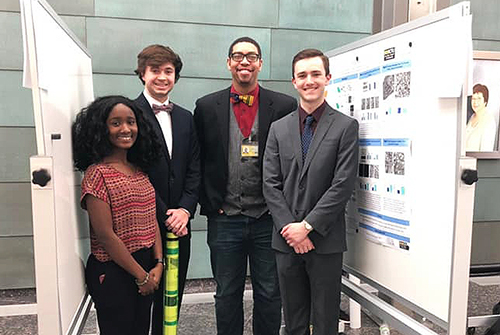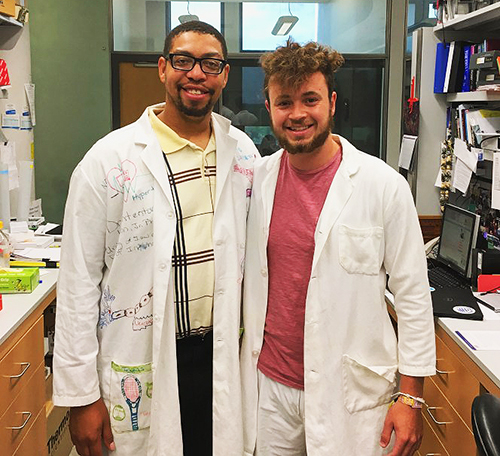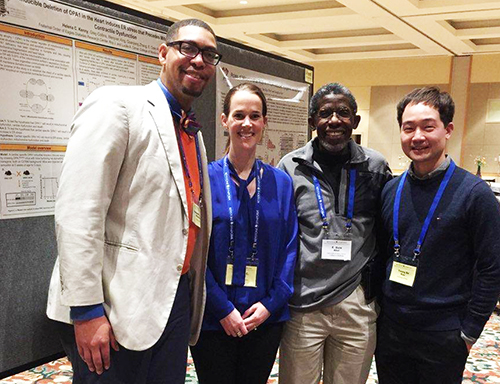Mentoring Contract
 This is an overview of what my expectations are for everyone in the lab, including myself, as your mentor and PI. If you are considering joining my lab, you should read this!
This is an overview of what my expectations are for everyone in the lab, including myself, as your mentor and PI. If you are considering joining my lab, you should read this!
Goals:

The overall goal of our lab is to elucidate the molecular mechanisms that regulate molecular transfer between and morphological changes of mitochondria and the endoplasmic reticulum and understand how these mechanisms are altered during pathophysiological states, particularly diabetes, obesity, and cardiovascular disease.
My primary job is to further research, which includes obtaining grant funding and performing studies that will make significant contributions to science, academia, and society. You will have the opportunity to train as a researcher and develop your career path to ultimately help me achieve this goal.
Our lab is an inclusive place. We welcome everyone regardless of their gender, race, religion, culture or creed. Everyone in our lab should be treated respectfully and be actively included. We communicate openly by being honest and clear when we may not know something and striving to learn all things we may not know.
Our lab will only work to publish and host top-tier research performed through collaboration and academic integrity.
Expectations:
 At all times, everyone in the lab should benefit from the research being performed. We employ rigorous scientific methods and conduct ourselves in an ethical, inclusive, and positive way to both those within and outside our lab. I can help you set goals and achieve them if we work closely together. You should be clear in defining your goals and come to me when you need guidance in that regard. We should have a line of communication that facilitates discussion of your goals and ensures timely and satisfactory progress toward them.
At all times, everyone in the lab should benefit from the research being performed. We employ rigorous scientific methods and conduct ourselves in an ethical, inclusive, and positive way to both those within and outside our lab. I can help you set goals and achieve them if we work closely together. You should be clear in defining your goals and come to me when you need guidance in that regard. We should have a line of communication that facilitates discussion of your goals and ensures timely and satisfactory progress toward them.
Skills:
 Conducting experiments: Take advantage of the opportunity to work at a world-class university by developing and refining stellar research skills with my help. I expect that you will utilize the resources of the lab to learn how to plan, design, and conduct high-quality scientific research.
Conducting experiments: Take advantage of the opportunity to work at a world-class university by developing and refining stellar research skills with my help. I expect that you will utilize the resources of the lab to learn how to plan, design, and conduct high-quality scientific research.
Presenting: Crucial in a career as a research scientist in academia, industry, or another sector is the effective presentation of your research results in seminars and at other professional gatherings. I expect that you will learn to how to make effective presentations through watching fellow lab members present, attending conferences, and taking time to practice your own presentations.
Writing: Writing is critical to a successful scientific career, and I expect you to hone your skills as a writer, both individually and in groups. Engage in collaborations within and beyond our lab group. Beyond writing a paper together, collaborations demand effective communication, trust, and respect; learning to be a strong collaborator in writing and research is an important mission of our lab.
Lab Notebooks: Your notebook should be written in a way that if someone wants to exactly repeat an experiment 10 years from now, they can do it. Everything you do should be reproducible, and notebooks should be the testament to this reproducibility. Be aware that your notes, records, and research data are lab property. When you leave the lab, you are welcome to make copies or convert your notebook digitally, but the original must stay in the lab indefinitely for future reference.
Mentoring: Everyone in this lab should ultimately aim to become a positive mentor one day. This is a valuable experience that includes working with others to boost their self-esteem and improve their work. Undergraduates working in the lab should be encouraged to contribute to the writing of manuscripts, and one should seek mentoring opportunities both inside and outside of the lab.
Career and Professional Development: Everyone in this lab should actively participate in their own professional growth and development, as facilitated by opportunities I provide.
Diversity, Equity, and Inclusion Training: This lab recognizes the importance of diversity in science, technology, engineering, mathematics, and medicine (STEMM) fields to foster an innovative environment equipped to solve the problems of tomorrow. All mentees should be trained to be culturally humble and may write manuscripts on DEI that further this training.
Networking: This lab recognizes the importance of forming lasting connections. Lab members are expected to be receptive to working with others and learning how to maximize their interactions by effective networking.
Individual Development Training: Lab members will be expected to have an individual development plan, which will provide guideline for their own individual growth in terms of professional and personal development, as well as setting realistic and worthwhile goals.
Leadership Training: Lab members will be expected to undergo leadership development to improve their roles as future mentors, PIs, or other STEMM positions. Leadership training should be accomplished through relevant workshops, seminars, and readings and through collaboration with STEMM students who are at an earlier phase of their careers.
Grant Development: This lab recognizes the importance of grants and other funding sources for the lab’s activities. As such, we recommend that during their tenure in our group, lab members familiarize themselves with the process of writing and applying for grants so they may become effective PIs in the future.
Community Outreach: Lab members will be expected to give back to the community in a positive and meaningful way throughout their tenure in the lab (and hopefully beyond). This includes community service, participation in community-led initiatives, and other beneficial events for the community.
Art of Collaboration: Lab members are expected to coordinate input from multiple mentors and research team members, such as constructive critique and feedback offered by mentor; asked for, reflected on, and applied by scholar; and followed up on by both mentor and scholar. Lab members should be ready to work with people from different research groups in different labs, departments, and institutions to maximize the impact of all work published by this lab.
Trademarking/Branding: Key to making an impact as a STEMM scholar is building a trademark that can leave a lasting impression on those you meet. Lab members are expected to, under the guidance of the lab mentors, build a trademark in a way that will promote their career development.